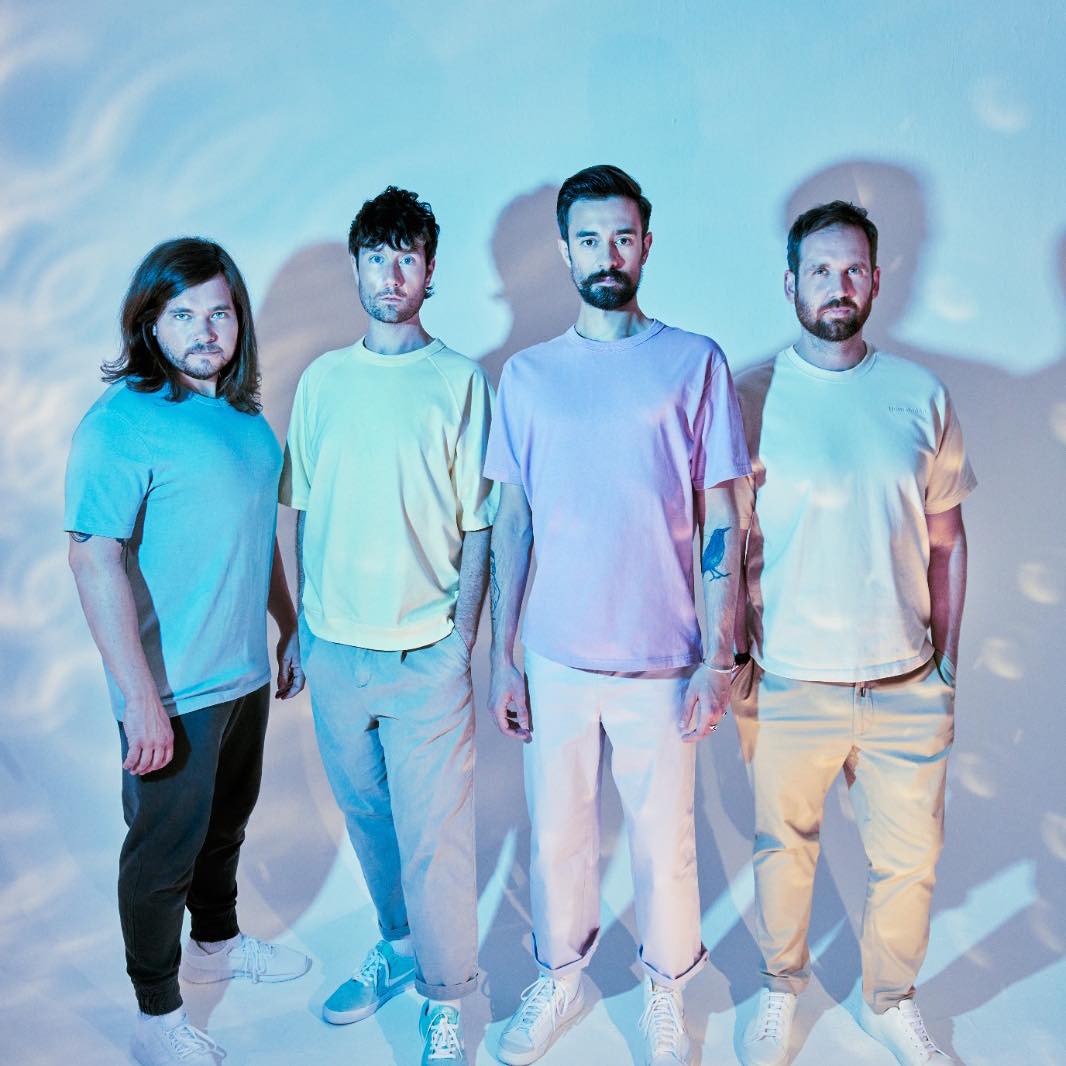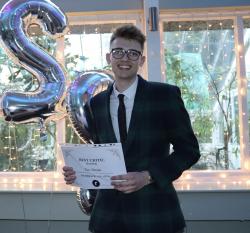
Music Critic Bas Bevan reviews Bastille’s latest album Give Me The Future, finding it to be an honest and creative approach to life and modernity
For their fourth album UK indie-pop outfit Bastille take a slightly different direction while still incorporating their style that focuses on atmosphere and varied and interesting instrumentation centred around the distinctive voice of singer Dan Smith. After rising to fame with ‘Pompeii’ off of their 2013 debut Bad Blood, Give Me The Future sees them look forwards instead of backwards and reflect on rapidly advancing technology as well as adventuring through fiction, film and culture. Like much of their previous music the band delve deeply into several emotions with some songs expressing dissatisfaction with modern life and wanted to escape and others oozing with optimism and carefree excitement. These two extremes are bridged by the album’s continuing themes and three interludes, one of which sees actor Riz Ahmed perform a poem which addresses the record’s main topics without the colourful musical chaos. Whilst being very much a Bastille album with its addictive, glittery pop, its futuristic and thoughtful narrative adds a new level of enjoyment to the band’s already story like music.
the song puts on show how Bastille can capture atmosphere in their music
Opening track and first single ‘Distorted Light Beam’ sets the scene for the album with its ominous sound and lyrical themes of finding positivity and freedom in the evolving, uncertain future as well as a focus on modern technology. Smith sings in the chorus ‘When I’m dreaming tonight I can do anything / When I’m dreaming tonight I can go anywhere / When I’m dreaming tonight I can be anyone / So don’t wake me up, don’t wake me up’ while the different electronic effects on his voice help the sound to mirror the track’s lyrics. Written with One Republic front man and serial hitmaker Ryan Tedder, the song puts on show how Bastille can capture atmosphere in their music with its moody synths and strings and almost eery vocoder.
In contrast to ‘Distorted Light Beam,’ ‘Thelma + Louise’ is more comparable to the band’s happier songs like 2016’s ‘Good Grief.’ Based on the 1991 film of the same name, excitement and adventure radiate from Smith’s vocals which are matched by the bouncy instrumental. The electronic instrumentation is used to different effect creating warmth and adding to the carefree fun.
Bastille have always had a deep level of emotion in their music which is enabled through their musical flair
The theme of classic films continues with ‘Back to the Future.’ Fiction is a big focus of the track with lyrics referencing George Orwell’s ‘1984,’ ‘Blade Runner,’ ‘The Wizard of Oz’ and Aldous Huxley’s novel ‘Island.’ Although this as well as the topic of dreaming are also dealt with on ‘Distorted Light Beam’ the song has an overall more positive and untroubled outlook. A warmth is created by the guitars and horns that are used and the slap bass and drums that seem in some ways funk inspired add to the track’s joyful sound.
The more simple and subdued ‘No Bad Days’ is one of the more emotional songs on the album. Bastille have always had a deep level of emotion in their music which is enabled through their musical flair which can perfectly capture a feeling and the vulnerability and honesty of Dan Smith’s voice and writing. The song was written in the aftermath of the death of Smith’s Aunt but despite being the most sombre one on the album it has a message of looking forward and sentimentality with him singing ‘So your future’s lost / But they can’t take your past.’ The use of vocal effects and a vocoder interestingly add to the emotion of the song by amplifying the tremors in Smith’s already sometimes shaking voice.
Another one of the upbeat songs on the album is ‘Shut off the Lights’ which has a similar spirit to ‘Quarter Past Midnight’ from 2019’s Doom Days as it is about letting go and enjoying life with those closest to you. The bubbly sound of the song matches its chorus of ‘Shut off the lights / We don’t need them to dance.’ The saxophone at the end of the track brings more of a classic sound to a very modern album as well as cramming even more happiness into the song.
Smith’s voice is unleashed where he begins to show its vulnerability and raw yet polished texture
‘Stay Awake?’ follows on from the other tracks with the idea of choosing not to live in reality. The song contemplates online dating and the state of the world begging ‘Stop the world, I wanna get off’ and asks ‘When my dreams run away, run away with you / Why would I stay awake, stay awake?’ The track features an array of the digital sounds that are used on the album including various synthesisers and robotic vocal effects and background noises.
The album’s title track is a downplayed one but features one of the best vocal performances from Smith on the record. His rhythmic singing in the verses is accompanied by a soft, controlled beat from drummer Chris ‘Woody’ Wood which builds tension in a way reminiscent of ‘In The Air Tonight’ by Phil Collins. In the chorus it opens out with thundering hits of the snare drum. Like the percussion Smith’s voice is unleashed where he begins to show its vulnerability and raw yet polished texture. The song is very much focussed on the vocals and percussion but guitars, strings and other sounds add subtle touches to an otherwise intense soundscape.
‘Club 57’ seems to depart from the album’s main themes both lyrically and instrumentally in favour of more traditional sound. Although not explicitly focussed on escaping the present like many of the other tracks the song explores the New York art and party scene in 1980s with Smith singing ‘Cut to Paradise Garage / There’s paint on my hands / Making arts for the masses.’ The song’s positive ideas are furthered by its guitar based sound and whistling which makes it which makes it one of the more optimistic and interesting tracks on the album.
Many of the album’s concerns and dreams of being transported away are overcome with ideas about appreciating the present
The story of the record is rounded off with ‘Future Holds.’ The song is at points very simple with just vocals and a piano but then it is also complex with several parts and many of the sounds featured elsewhere. The layers of Smith’s voice also change throughout the track with sections where they are multiplied creating a futuristic choir effect which when combined with the soulful voice of BIM, has an incredibly uplifting and hopeful effect. Many of the album’s concerns and dreams of being transported away are overcome with ideas about appreciating the present with the chorus being ‘Who knows what the future holds? / Don’t matter if I got you’.
Give Me The Future applies Bastille’s engaging sound to interesting concepts and topics in a way that make the record cohesive but not seem repetitive. The album takes you through complex emotions from the unrestrained fun of ‘Shut Off The Lights,’ the grief of ‘No Bad Days’ and the despondence of ‘Distorted Light Beam’ and ‘Stay Awake?’ It sees the band journey through the ups and downs of life today and how the past, present and future interact making the album relevant and relatable. Although the band do not have all the answers, their honesty and creativity make Give Me The Future a captivating record.
Rating: 8/10
You Might Also Like:

Comments